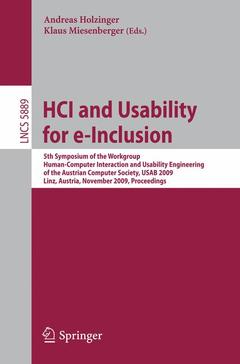HCI and Usability for e-Inclusion, 2009 5th Symposium of the Workgroup Human-Computer Interaction and Usability Engineering of the Austrian Computer Society, USAB 2009, Linz, Austria, November 9-10, 2009, Proceedings Programming and Software Engineering Series
Langue : Anglais
Coordonnateurs : Holzinger Andreas, Miesenberger Klaus

This book constitutes the refereed proceedings of HCI and Usability for e-Inclusion, held as the 5th Symposium of the Workgroup Human-Computer Interaction and Usability Engineering of the Austrian Computer Society, USAB 2009, in Linz, Austria, in November 2009. The 12 revised full papers and 26 revised short papers presented were carefully reviewed and selected from 60 submissions. The papers are organized in topical sections on gender and cognitive performance, usefulness, usability, accessibility, emotion, confidence and elderly, usability testing, evaluation, measurement, education, learning and e-inclusion, design for adaptive content processing, grounded theory, activity theory and situated action, smart home, health and ambient assistent living, user centred design and usability practice, interaction, assistive technologies and virtual environments, communication, interfaces and haptic technology as well as new technologies and challenges for people with disabilities.
Keynote: New Trends in Human–Computer Interaction.- The Changing Face of Human-Computer Interaction in the Age of Ubiquitous Computing.- Age, Attitudes, Abilities, Acceptance, Attention: Gender and Cognitive Performance.- Different Perspectives on Technology Acceptance: The Role of Technology Type and Age.- A Mixed-Method Approach on Digital Educational Games for K12: Gender, Attitudes and Performance.- Improving Cognitive Abilities and e-Inclusion in Children with Cerebral Palsy.- Finding Relevant Items: Attentional Guidance Improves Visual Selection Processes.- Usefulness, Usability, Accessibility, Emotion: Confidence and the Elderly.- Which Factors Form Older Adults’ Acceptance of Mobile Information and Communication Technologies?.- A Usability and Accessibility Design and Evaluation Framework for ICT Services.- The Building Bridges Project: Involving Older Adults in the Design of a Communication Technology to Support Peer-to-Peer Social Engagement.- Cultural Specific Effects on the Recognition of Basic Emotions: A Study on Italian Subjects.- Usability Testing, Evaluation, Measurement: Education, Learning and e-Inclusion.- Digital Literacy – Is It Necessary for eInclusion?.- Enhancing Wikipedia Editing with WAI-ARIA.- Seeing the System through the End Users’ Eyes: Shadow Expert Technique for Evaluating the Consistency of a Learning Management System.- Accessibility of Educational Software: A Problem Still to Be Solved.- Special Session: Design for Adaptive Content Processing.- Accessibility-by-Design: A Framework for Delivery-Context-Aware Personalised Media Content Re-purposing.- Generating Dialogues from the Description of Structured Data.- Book4All: A Tool to Make an e-Book More Accessible to Students with Vision/Visual-Impairments.- Enhancing Accessibility of Web Content for the Print-Impaired and Blind People.- Heuristics and Theory Based Research: Grounded Theory, Activity Theory and Situated Action.- Towards the Era of Mixed Reality: Accessibility Meets Three Waves of HCI.- Investigating Agile User-Centered Design in Practice: A Grounded Theory Perspective.- A Bridge to Web Accessibility from the Usability Heuristics.- E-Inclusion in Public Transport: The Role of Self-efficacy.- Special Session: Smart Home, Health and Ambient Assisted Living.- Smart Home Technologies: Insights into Generation-Specific Acceptance Motives.- User Interaction Design for a Home-Based Telecare System.- A Videophone Prototype System Evaluated by Elderly Users in the Living Lab Schwechat.- Avatars@Home.- Effects of Aging and Domain Knowledge on Usability in Small Screen Devices for Diabetes Patients.- User Centred Design and Usability Practice: Showcases and Surveys.- A Standalone Vision Impairments Simulator for Java Swing Applications.- AltText: A Showcase of User Centred Design in the Netherlands.- Usability Practice in Medical Imaging Application Development.- Current State of Agile User-Centered Design: A Survey.- Applications and Analyses: Interaction, Assistive Technologies and Virtual Environments.- Predicting Pointing Time from Hand Strength.- Analyzing Interaction Techniques Using Mouse and Keyboard for Preschool Children.- The Use of ICT to Support Students with Dyslexia.- Investigating of Memory – Colours of Intellectually Disabled Children and Virtual Game Addict Students.- Analyses and Investigations: Communication, Interfaces and Haptic Technology.- A Sign Language Screen Reader for Deaf.- Spoken Dialogue Interfaces: Integrating Usability.- Usability and Accessibility of eBay by Screen Reader.- Video Relay Service for Signing Deaf - Lessons Learnt from a Pilot Study.- Using a Log Analyser to Assist Research into Haptic Technology.- Closing: New Technologies and Challenges for People with Disabilities.- Usability in Public Services and Border Control.
Date de parution : 10-2009
Ouvrage de 554 p.
15.5x23.5 cm
Thèmes de HCI and Usability for e-Inclusion :
© 2024 LAVOISIER S.A.S.



